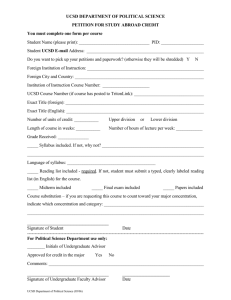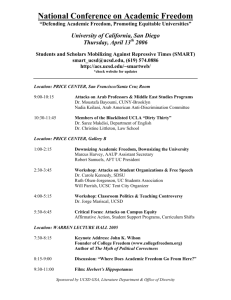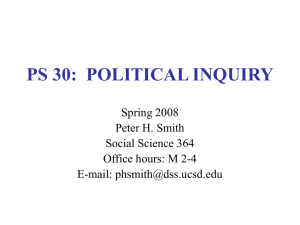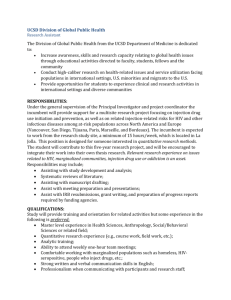PowerPoint Lecture - UCSD Department of Physics
advertisement
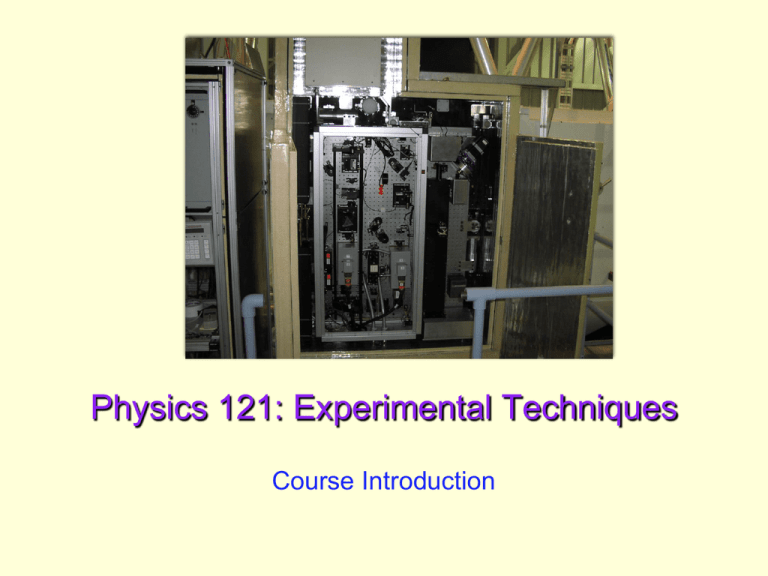
Physics 121: Experimental Techniques Course Introduction UCSD: Physics 121; 2012 Course Goals • Bestow upon you the skills you will use in practical lab settings • Let’s say you want to participate in physics research at UCSD… • You will be asked: what can you do? – – – – – program? electronics? mechanical design? optical design? vacuum systems • What will your answer be? Winter 2012 2 UCSD: Physics 121; 2012 Course Content • Mechanical Design – designing/machining parts, mechanical flexure • Thermal Design – understanding heat flow • Optics – geometrical optics/raytracing • Vacuum and Cryogenics – requirements and techniques • Analog Electronics – power supplies, op-amps, LEDs • Computer Interface – serial, parallel ports; D/A converter, mag-swipe; Cprogramming Winter 2012 3 UCSD: Physics 121; 2012 Why should you work hard in this class? • You can get shortchanged by going to a research university – professors are primarily interested in research • How to offset: participate in research! • But there’s a barrier: experience • This class can provide some of this needed experience – but only an initial exposure – realistically, a one-quarter course can’t do it all • So you win big if you put a lot in • And aside from research, mastering these skills makes you an asset to employers Winter 2012 4 UCSD: Physics 121; 2012 My Background • Why is this relevant? – it influences the type of exposure I can offer in this course • Amateur Astronomer (high school, mainly) – built telescope, did astrophotography • Co-op student at Naval Research Lab – worked on lasers, optics, interfacing equipment, telescopes – learned to machine, use a theodolite, many optical tools • Grad student in physics/infrared astronomy – built infrared spectrograph for Palomar 200-inch telescope • tons of machining • some cryogenic exposure • Postdoc at UW – began building lunar laser ranging apparatus – diversity of optics, mechanics, electronics, thermal Winter 2012 5 UCSD: Physics 121; 2012 Failure mode • The downside is that I’m trying to cram stuff I learned over years into a single quarter • For me, learning all this stuff was a lot of fun – no substitute for pursuing on your own • Within class structure, it is unlikely to be as fun for you as it was for me – hard to formulate a class without “cookbook” flavor – but this is partly up to the individual – and we’ll try to be careful about this • At least you’ll get an intro to things that you can learn more thoroughly on your own in the future – and hopefully the intro will make the eventual process easier Winter 2012 6 UCSD: Physics 121; 2012 Invitation to Explore • The labs/projects will not be as “cookbook” as many you have experienced – partly because real experimentation is not cookbook – partly because the best learning comes when you write the recipe • Allow your natural curiosity to guide you – if the lab inspires a question, think of ways to answer the question – what could you measure?; how would you measure it? – little side-projects may be more valuable to your learning than the “main” task at hand – seek help on how to explore further • Please offer feedback: we want you to learn! Winter 2012 7 UCSD: Physics 121; 2012 Grading Scheme • What’s important is how much you learn: how much you understand; how much you can do – this is more important than the grade (really!) • Grades based 80% on labs/projects: – completion, success, demonstrated verbal understanding – some supporting calculations accompany each project – write-up describing the point, the critical concepts, data/results, and what you learned from the experience – less structured than cookbook lab reports – but clear communication is very important: do a good job! • 20% in final exam (exam is academic requirement) • So: must stay plugged in throughout course – late labs (up to a week) only count HALF credit Winter 2012 8 UCSD: Physics 121; 2012 Resources • Professor: – Tom Murphy; SERF 336; 534-1844; tmurphy@physics.ucsd.edu – Office hours Monday 4–5 PM, or by appointment • Teaching Assistant: – Travis Wong; tjw006@ucsd.edu – Office hours Mon. 10–11 AM AND Tue. 3:30–4:30 PM • Lab Partner: – work cooperatively on lab portion – discuss write-up, but must be your own words/effort – copying text/sections will result in grading penalty • The Lab (MHA 3544/3574): – available throughout quarter with ID card access Winter 2012 9 UCSD: Physics 121; 2012 Lab Access • The lab hours are officially 2–6 PM Wed. – Travis and I will be present during these times – Useful Intro, tips, etc. at beginning of each session – Previous week’s lab also due by 2PM sharp • But you may spend as much time as you like/need to get the job done – please coordinate with partner, otherwise problems • Will borrow ID cards in first lab session to establish access • Please do not remove equipment from the lab – tempting as it is! – accidental damage/loss could cause problems Winter 2012 10 UCSD: Physics 121; 2012 Website • The course website is at: – http://physics.ucsd.edu/~tmurphy/phys121/ • The website resources contain: – course syllabus and related course info – lectures (PowerPoint and PDF), typically prior to class time – information on labs (procedures, write-ups, requirements) • supplemental info like datasheets, etc. Winter 2012 11 UCSD: Physics 121; 2012 Text • Building Scientific Apparatus, 3rd or 4th edition – by Moore, Davis, Coplan – I will specify reading assignments in both editions • As good a match as one might hope for this class – but not perfect overlap, of course • Decent resource for physics experimentation – a wide range of topics, and good pointers to additional resources • Questions??? Winter 2012 12


